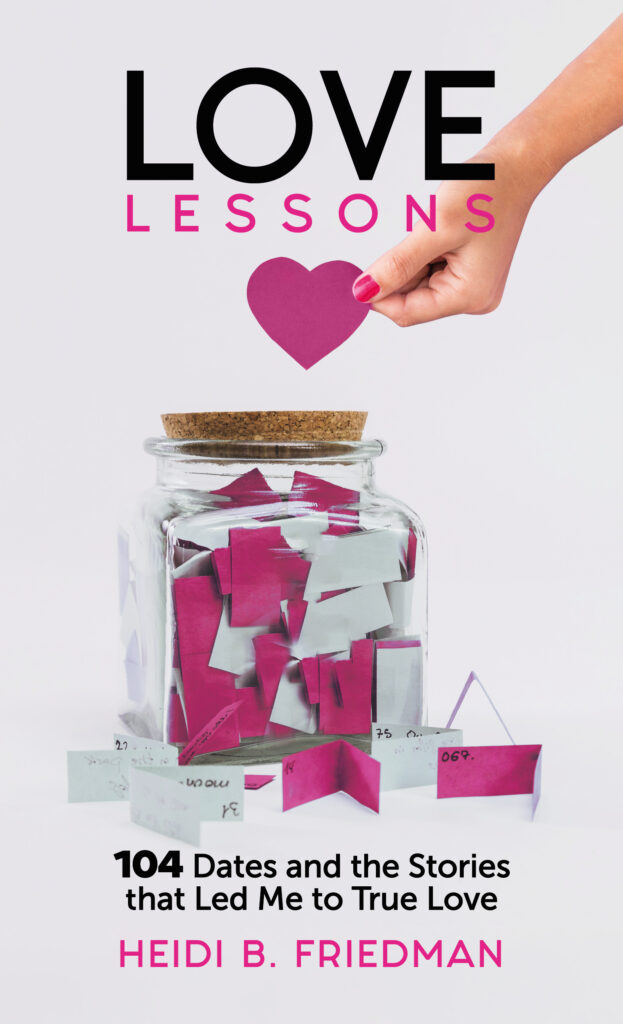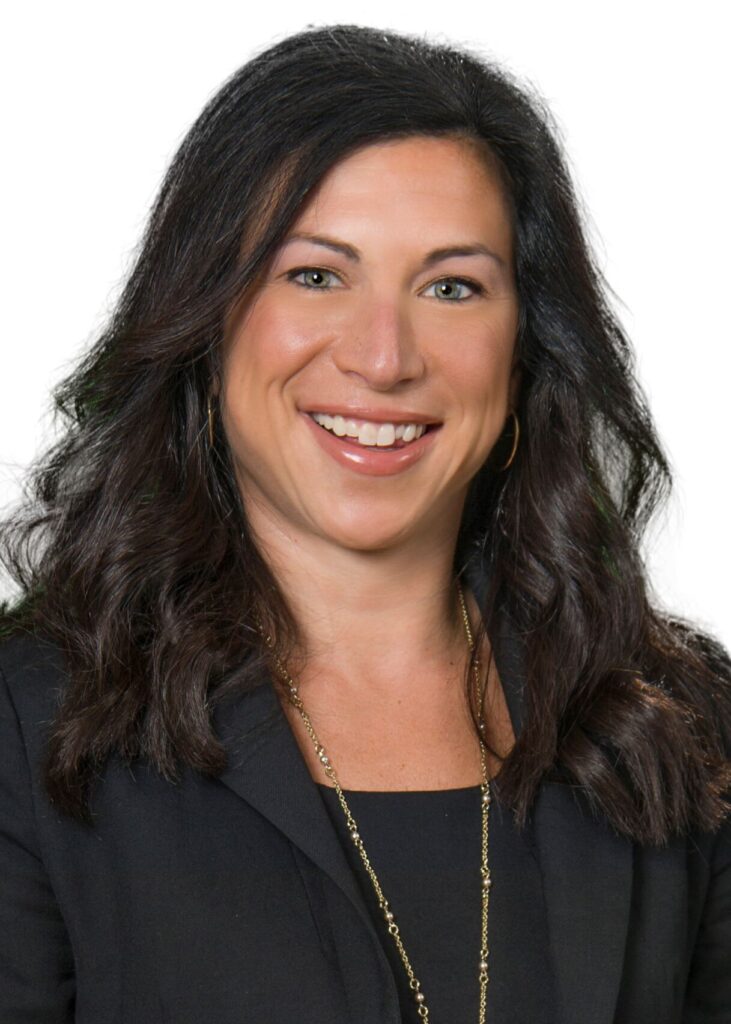Attorney Heidi Friedman writes a book of ‘love lessons’

By Carlo Wolff
Five years after her divorce, Heidi Friedman found herself searching for true love yet again, sounding out friends and family for ways to secure that desired state, and dating with various degrees of satisfaction.

As a partner in the Cleveland law firm Thompson Hine, Friedman travels a lot, which gave her time to look over notes she’d made of discussions with friends about various aspects of love. While the subject proved elusive, over time, certain themes she’d explored in her research into true love began to come clear: ease in the relationship, physical attraction, shared notions of trust and balance, feeling safe – a general sense that true love is a meeting of not only our minds and bodies but of our best selves.
Friedman digs deeply and honestly into these themes, and the journey she took that led her to her second husband, Will Friedman, in the recently published “Love Lessons: 104 Dates and the Stories that Led Me to True Love.” Her slim, absorbing book is part memoir, part advice column, part social history. Friedman’s voice – sympathetic, candid, funny, yet never mawkish – is clear and distinctive.
A self-styled “serial overanalyzer,” Friedman wrote the first eight chapters of her first book in 2010, distilling wisdom she had gleaned from conversations she’d had with 52 people. She put the project aside when life got in her way as she raised two children and maintained a busy work schedule, returning to it last year to finish it with input from six more sources. Those six, interviewed in the wake of the COVID-19 pandemic, led to “Love’s Lessons Learned,” the last part of the book – and the last part she wrote. Friedman had more material than she needed. Other factoids about her book: Everybody she approached wanted to talk about true love, and nobody claimed to have found true love at first sight.
Get out there
The key to finding true love is to put yourself into circulation, to be open-minded, and to be flexible, Friedman advises. “I think that we have ideas of what we want in our head, and they don’t always match up with what we need,” Friedman said in a recent interview at the Cleveland Heights mansion she shares with her husband and their dog, Felix. “I also feel that sometimes people don’t put themselves out there enough. So the one thing I do is when I meet somebody at a cocktail party and they say they’re single, I say, ‘Are you dating?’ And they’ll say, ‘Well, not really.’”
Which prompts her to ask whether they’re searching for true love by using apps (which she recommends) and participating in organizations like Cleveland Yoga, a group Friedman joined where she befriended a woman who fixed her up with Will, who would become her husband and her first true love. Will Friedman is semi- retired; he was president and CEO of the Cleveland-Cuyahoga County Port Authority from 2010 until the end of last year, when he left the post following a contract dispute.
If somebody tells her they work at home and don’t get out much, Friedman asks, “Are you going to marry the UPS driver? Because no one’s going to just show up and knock at your door. And so my whole thing is sometimes I think people wait for it to happen without doing something to make it happen, which is true about life. Half of it is showing up.”
If somebody tells her they work at home and don’t get out much, Friedman asks, “Are you going to marry the UPS driver? Because no one’s going to just show up and knock at your door. And so my whole thing is sometimes I think people wait for it to happen without doing something to make it happen, which is true about life. Half of it is showing up.”
HEIDI FRIEDMAN
Staying on track
A native of South Euclid, this petite dynamo graduated from Brush High School in Lyndhurst and earned summa cum laude law degrees from Case Western Reserve University School of Law in Cleveland and The Ohio State University in Columbus. In her 30th year at Thompson Hine, Friedman leads a “very large environmental practice,” and, armed with a certificate in environmental, social and governance practice from UC Berkeley Executive Education, helps companies deal “mostly with things like greenhouse gas, emissions, diversity, all the things that are in flux and being challenged right now,” she says.
“My specialty is actually serving as national counsel for large companies, doing all of their environmental health and safety across the country,” Friedman says. “We do all of their permitting, all of their remediation projects, all of their audits.”
Friedman brings the tenacity she displays in the courtroom to her work defining, finding and practicing true love.
“Overthinking is my curse and my superpower,” she writes on Page 61 of her book.
“If you ask me a question, or present me with a problem,” she says, “I will not stop thinking about it until I solve it … I’m very good at taking on everyone’s problems and trying to figure out how to solve them, but in my work, I do my best job by preventing things from happening for clients in the future. So I’m always trying to think ahead to mitigate risk for them.”
As her book was taking shape, Friedman said, she was analyzing what love looks like “from a very theoretical perspective,” asking a lot of different people, ‘What does true love look like for you? How did you know it was your person?’ Because for me, I’m a very black-or-white person; usually it’s either yes or no, and I was looking for the answer. And instead, I found themes that were woven through all these answers that I talk about in the book that really seemed applicable to anyone or everyone, no matter who you love. And it allowed me to understand that it’s probably just as much a feeling as it is a definitive something you can put your finger on.”
Friedman interviewed all kinds, mostly individually: men and women, same-sex couples, people in their twenties to people in their sixties, including her parents, true-love role models for her. She did not interview trans people when she was writing the first part of the book, but noted that her daughter is gender-fluid and “moving on the trans scale.”
“Love is love,” Friedman said, “and definitely my kid has taught me that.” At women’s conferences she attends, Friedman meets women who “I think focused on their career and didn’t necessarily meet someone and are having trouble.” They find that her book helps.
“What I didn’t contemplate is it seems to really be touching people who are also married, and I’ve talked to both men and women who have read it.” A woman who has been married for almost 30 years recently told Friedman her book “really made her reflect in such a good way about her relationship, how the themes apply to her relationship, how she wants to spend more time investing in her relationship, and just generally keeping it in a positive, important place, where it needs to be. But whether you’re single, married, divorced, it seems to be hitting everybody, which has been really great.”
Writing “Love’s Lessons” was cathartic for her, and, she said, she looks forward to writing another book, perhaps with her daughter. “I’m thinking about maybe writing a book about the journey of being a mom to a gender- fluid child,” she says. “I’m finding that a lot of people are in my similar position and need a little camaraderie and understanding.”
